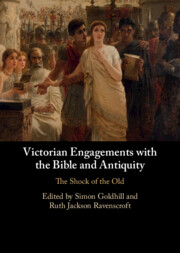Book contents
- Victorian Engagements with the Bible and Antiquity
- Victorian Engagements with the Bible and Antiquity
- Copyright page
- Contents
- Figures
- Contributors
- Acknowledgements
- 1 Introduction
- Part I Antiquity’s Modernity
- Part II Making the Past Visible
- Part III Materiality and Spectacle
- Part IV Travelling the World
- 8 Protestant Travellers to Rome and the Legacies of the Apostolic Church
- 9 HMS Bacchante
- Part V Manuscripts, Morality, and Metaphysics
- Part VI Intellectual Superstars
- Bibliography
- Index
8 - Protestant Travellers to Rome and the Legacies of the Apostolic Church
from Part IV - Travelling the World
Published online by Cambridge University Press: 28 September 2023
- Victorian Engagements with the Bible and Antiquity
- Victorian Engagements with the Bible and Antiquity
- Copyright page
- Contents
- Figures
- Contributors
- Acknowledgements
- 1 Introduction
- Part I Antiquity’s Modernity
- Part II Making the Past Visible
- Part III Materiality and Spectacle
- Part IV Travelling the World
- 8 Protestant Travellers to Rome and the Legacies of the Apostolic Church
- 9 HMS Bacchante
- Part V Manuscripts, Morality, and Metaphysics
- Part VI Intellectual Superstars
- Bibliography
- Index
Summary
This chapter shows how the material and ritual legacies of apostolic Rome provoked debate among Protestant travellers and called attention to the intertwined legacies of early Christianity and imperial Rome. We demonstrate how one site (St Peter’s Basilica) became a battleground for sectarian readings of the apostolic past. Previous scholarship has demonstrated how anglophone travellers constructed their modernity in opposition to an imagined archaic Italian Other. Yet critics have paid insufficient attention to how religious difference and sectarian identity shaped such attitudes. Catholics had a special commitment to validating the early history of the Roman Church, but Protestants also had an active interest in apostolic legacies. By demonstrating that the earliest Christians practised a simple and earnest form of worship – anathema to the splendour of medieval Catholicism – Protestant commentators vindicated their faith as a return to apostolic authenticity. Yet if British and American travellers wanted to put Catholicism in its place, some Catholics sought to win over Protestant sceptics by appealing to a shared antiquarian epistemology, combining the aesthetic appeal of Catholic ritual with an historicizing emphasis on the material legacies of apostolic antiquity.
- Type
- Chapter
- Information
- Victorian Engagements with the Bible and AntiquityThe Shock of the Old, pp. 211 - 234Publisher: Cambridge University PressPrint publication year: 2023



